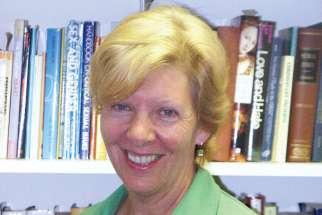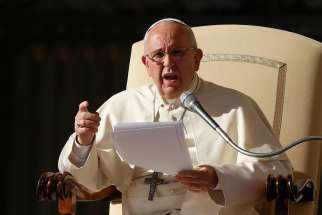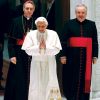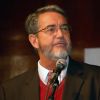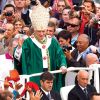Contrasts in evangelization
WINDSOR, ONT. - Between the feast days of Canada’s newest saints, the archbishop of Quebec City argued for an authentically Canadian approach to the evangelization of native peoples that offers a model for the evangelization of culture today.
Nun has found her happy place
In Sr. Anna Chan’s earlier career in retail management, she sought happiness through a love of fine clothes, shoes and bags.
“I was looking for happiness,” said Chan, “but I was looking in the wrong place.”
NET Canada turns 20!
Twenty years of youth ministry is a big deal, which is why NET Ministries of Canada decided to celebrate the milestone with a year-long celebration.
Connecting a community of Catholics online
One of the hardest things about moving to a small town is integrating into the community. After my last column was published, I was offered a job in northeastern Alberta and found myself moving to the town of St. Paul. It’s the centre of the diocese and at approximately 6,000 people it’s the smallest municipality I’ve ever called home.
Pope Francis bringing synodality back to Church
TORONTO - Giving advice to the Pope is not a one-way street. It begins with Pope Francis giving advice to his advisors — including Canadian theologian Moira McQueen.
Cultural war is coming
In mid-November, Pope Francis gave an address to new communities and ecclesial movements in the Church that was, even by his high standards, utterly inspiring.
Growing up in Nigeria, Fr. Maurice Emelu never imagined his calling would take him around the world and eventually put him in front of TV cameras that reach up to 230 million homes in 144 nations.
A new evangelization can happen
Late last year the National Post commissioned a survey on religious attitudes of Canadians. It will surprise no one that church attendance, both Protestant and Catholic, is dropping. What was surprising was how Canadians self-reported their attitude to religion.
Of those answering the survey, 65 per cent consider themselves “spiritual,” 50 per cent consider themselves “religious” yet 66 per cent said they believe in God. What to make of this?
First, contemporary mis-education has prevented many people from thinking clearly. If you believe in God, you are by definition “religious.” The Oxford English Reference Dictionary defines religion as belief in a personal God “…entitled to obedience and worship.” So to say that someone believes in God but is not religious is to utter an oxymoron.
As for the 15 per cent who consider themselves spiritual (“concerned with sacred or religious things”) but not religious, well, they truly are remarkable human beings. They are like a self-described gourmand who never eats, or someone who professes to love travel but does not leave home, or a lover of theatre who has never seen a play that he enjoyed.
Of course, one might be spiritual and not go to church; that is possible. I suppose one might even be a Protestant Christian and never go to church. But one cannot be a Roman Catholic and refrain from attending church.
That’s because the catechism teaches that there is no salvation outside the Church. The Catechism of the Catholic Church (published in 1994) expresses the point this way: “All salvation comes from Christ the Head through the Church which is His body.” Again, none can be saved “who knowing that the Catholic Church was founded as necessary by God through Christ, would refuse to enter it or to remain in it.”
Catholics have an obligation to attend Mass. One may attend Mass outside the physical structure of a church, but only a priest may consecrate the elements of bread and wine. For a Catholic to say that he is spiritual but not religious is what Dr. Johnson once called “nonsense on stilts.”
The priest who brought me into the Catholic Church never referred to the “obligation” to attend Mass. It was always, he insisted a privilege. And with him presiding, it always was. He prepared carefully for each service. His homilies were strengthening and he threw himself into every activity in the church with gusto. To my chagrin, I have discovered that this is not always the case.
Of course, I understand that one does not attend Mass because of the priest but rather for the opportunity to receive the sacraments. Still, it is difficult to be in a suitably receptive frame of mind to receive the sacraments when one is fuming inwardly at all that has gone on up to that point. Perhaps I am only now discovering the reality of what Flannery O’Connor meant when she wrote that one may suffer more from the Church than for the Church.
If the new statistics accurately portray Canadians’ religious attitude, what hope is there for the Church? Well, Pope Benedict XVI recognizes the problem; indeed he wrote extensively about this even before the year 2005 when he became Pope. He has called repeatedly for a “New Evangelization” with three components: (1) deepened personal faith; (2) renewed Bible study; (3) proclamation of the Gospel.
The Pope has said that it is the duty of every Catholic to proclaim the good news “with the same enthusiasm as the early Church” and he has taught that “the Gospel is not the exclusive property of those who received it, but it is a gift to share, good news to report to all.”
In this respect, buried in the statistics, is one nugget which allows for hope: 15 per cent of Canadian youth report that they are more committed to the faith than were their parents. Here is the potential spearhead of a new evangelization that can rescue the Church from the doldrums.
The new evangelization will not happen in parishes where the message is distorted, or where the priest is only going through the motions, or where the congregation trudge off content at having satisfied their obligation. But the message of hope from Pope Benedict XVI is that it can — and will — happen nevertheless.
Education, evangelization go hand in hand
OTTAWA - Education in the Catholic tradition is indispensable to evangelization, theologian and educator Colin Kerr told the Catholic Teachers’ Guild here Nov. 20.
Synod members propose ways to promote evangelization
VATICAN CITY - Members of the Synod of Bishops recommended the Vatican establish a commission to monitor religious freedom, develop guidelines for training evangelizers and ensure there is a church in every diocese where confession is always available.
At the end of the three-week world Synod of Bishops on new evangelization, members of the gathering approved 58 propositions to give to the pope; although synod rules say the proposals are secret, Pope Benedict authorized their publication Oct. 27.
The propositions were designed as recommendations for the pope to use in a post-synodal apostolic exhortation. Many of the propositions described current challenges and opportunities that the church faces in sharing the Gospel, strengthening the faith and reaching out to lapsed Catholics.
Other propositions asked Pope Benedict or individual bishops to consider undertaking concrete projects, including:
-- Establishing a Vatican commission to monitor religious freedom around the world, denounce attacks on religious freedom and promote a broader understanding of its importance as a basic human right.
The propositions said, "The proclamation of the good news in different contexts of the world -- marked by the process of globalization and secularism -- places different challenges before the church: at times in outright religious persecution, at other times in a widespread indifference, interference, restriction or harassment."
During the synod discussions, bishops in different parts of the world described different relationships with Muslim neighbors, ranging from situations in which Christian minorities experience serious discrimination to cases of Catholics and Muslims working together to address social problems.
The synod propositions encouraged Catholics "to persevere and to intensify their relations with Muslims" in accordance with the teaching of the Second Vatican Council.
-- Developing a "pastoral plan of initial proclamation" that would outline steps to help ensure that once people hear the Gospel, they are led to conversion and faith and are educated in church teaching. It also should describe the "qualities and guidelines for the formation of Catholic evangelizers today."
-- Asking that every diocese establish a parish or shrine dedicated "in a permanent way" to the administration of the sacrament of penance, ensuring "priests are always present, allowing God's mercy to be experienced by all the faithful."
"The sacrament of penance and reconciliation is the privileged place to receive God's mercy and forgiveness," it is a place of healing and strength, and it is the sacrament that can bring people back into full communion with the church, the synod members said.
As they did in the synod hall, synod members used several propositions to emphasize the importance of the family as the place where life and love are first given, where people are introduced to the faith and where they learn to live according to Gospel values.
The church's new evangelization efforts must help strengthen families and must try "to address significant pastoral problems around marriage: the case of divorced and remarried (Catholics), the situation of their children, the fate of abandoned spouses, the couples who live together without marriage and the trend in society to redefine marriage," synod members said.
Recognizing an increase in secularism around the world, synod members said that in many ways Christians are living "in a situation similar to that of the first Christians," who were small minorities in cultures indifferent or even hostile to Christianity.
Still, synod members said, "the world is God's creation and manifests his love." Even if Christians are just a little flock, they are called to "bear witness to the Gospel message of salvation" and "to be salt and light of a new world."
The propositions emphasized that while the primary task of the church is to bring people to a personal relationship with Jesus Christ, a relationship lived and nourished in the church, part of reaching out to others and witnessing to the Gospel involves serving the poor and sick, working for justice and protecting the environment.
Synod members praised the members of religious orders, who have been on the frontlines of evangelization for centuries, as well as the activities of new movements and communities. But they stressed the importance of all members of a diocese coordinating their work with the local bishop, and they insisted on the key role of parishes as the places where most Catholics learn about and practice their faith.
The propositions included a suggestion that parish priests or other designated parish staff visit families in the parish as part of their outreach.
The propositions described the liturgy as "the primary and most powerful expression of the new evangelization" and a manifestation of God's love for humanity.
"Evangelization in the church calls for a liturgy that lifts the hearts of men and women to God," synod members said.
During synod discussions, several bishops spoke about the importance of the church learning the particular language and culture of social media and new technology to share the Gospel with people who increasingly spend their time online.
In the propositions, they said Catholics should be trained "to transmit faithfully the content of the faith and of Christian morality" through the media, but they insisted that no technical talent or online presence could take the place of "the testimony of life" lived in accordance with the Gospel.
Synod members described young Catholics not primarily as objects of evangelization, but as evangelizers, especially of their peers.
"As the media greatly influence the physical, emotional, mental and spiritual well-being of the youth," they said, "the church through catechesis and youth ministry strives to enable and equip them to discern between good and evil, to choose Gospel values over worldly values, and to form firm faith convictions."
Jesus key to the new evangelization
TORONTO - The challenge the Catholic Church faces with the new evangelization is to lead people out of the darkness, theologian and Catholic apologist Scott Hahn told a Toronto audience Oct. 20.
More than 1,400 people came to hear Hahn describe the new evangelization, its challenges and goals at Canada Christian College. He was brought to Canada by Catholic Chapter House for “The New Evangelization! Equipping Yourself To Engage The Culture.”
“Evangelization is the grace and vocation most proper to the Church,” said Hahn. “The new evangelization is new precisely because of the unique needs we now have. It’s re-evangelizing the secular cultures that are on the brink of losing any sense of their own Christian identity.”
A former Presbyterian minister, Hahn joined the Catholic Church in 1986. Since then he has penned 13 books, been awarded a doctorate in systematic theology from Marquette University and is president of St. Paul Centre for Biblical Theology, a Christian think thank in Steubenville, Ohio, which he founded in 2001.
In defining new evangelization, Hahn made note of four principle laws of evangelization: God loves you; you sin; Christ died for your sins; and what are you going to do? By acknowledging these fundamental aspects of Catholic evangelization, one is able to build the foundational personal relationship with Jesus.
“A personal relationship with Jesus is where we all have to begin but it’s only a beginning, it isn’t the end,” said Hahn.
That’s because the new evangelization goes far beyond developing a personal relation by reaching towards an understanding of the covenant of communion that reflects the inner life of God, the Son and the Holy Spirit.
The best way to develop, and promote, the connection to one’s faith is through attention to the real presence of Christ in the Eucharist. In other words, one must be able to see it as a holy sacrifice of Jesus’ body and blood rather than unleavened bread and a chalice of wine. Where people of the past would simply accept this because a priest said it was so, today society demands an understanding of it and that is the goal of new evangelization. Our greatest tool to find this understanding, said Hahn, is the Catechism of the Catholic Church.
“It isn’t something that is just over and done in a day,” he said. “It’s something that you can start anywhere you find yourself but it is always going to lead to the goal of eucharistic communion.”
But new evangelization faces resistance even from those already deeply connected to their Catholic faith. Hahn summarized the common objections to undertaking the task into two categories: Catholics don’t evangelize and it’s not about telling, it’s about action. To both Hahn has one response.
“To be a Catholic is a call to bear witness to our faith no matter where we find ourselves in life. To not share is to not be Catholic.”
Synod to set vision for the new evangelization
The global Church is in Rome to talk about how it talks to the world. The topic is the new evangelization,meaning all the ways the Church presents Christ to the world and how we are all called to serve.
The Synod of Bishops on the New Evangelization for the Transmission of the Christian Faith is more than a distant talking shop for high Church officials. It also provides the keys to the Year of Faith which launched Oct. 11, the 50th anniversary of the Second Vatican Council.
It’s the 25th such synod since the close of Vatican II and runs Oct. 7 to 28.
There will be two English and two French bishops from Canada among the approximately 170 bishops chosen by bishops’ conferences around the the world. The Canadian Conference of Catholic Bishops elected to send Quebec City’s Archbishop Gerald Cyprien Lacroix, Antigonish Bishop Brian Dunn, St.-Hyacinthe Bishop Francois Lapierre and Nelson Bishop John Corriveau.
The voting members of the synod will also include 20 bishops from Eastern Catholic Churches, 25 bishops who work in the Vatican heading up various offices, 35 bishops named directly by the Pope and 10 representatives from religious orders chosen by the Union of Superiors General.
Regis College professor of theology Sr. Gill Goulding will be the Canadian among 49 theological experts assigned to assist the synod fathers and contribute to discussions. The theologians and thinkers don’t get to vote, but their contributions to discussions may substantially contribute to what the bishops vote on.
How the synod will be understood outside Vatican City may have a lot to do with another Canadian. Basilian Father Thomas Rosica, CEO of Salt + Light Catholic Media Foundation, will be the English-speaking press secretary for the duration of the synod.
Though there will be lots of talk about new media and the digital age, Fr. Steve Bossi doesn’t want the bishops to come back from Rome with a social media strategy or a new comfort level with smartphones.The new evangelization is about a lot more than technology or better media management, said the director of programs at Toronto’s Paulist Centre.
“They need to come back with a vision,” said Bossi. “They need to come back with a sense of what is the modern world and how does it function. Then, how do we speak our faith into that modern world?”
In the lineamenta or discussion paper for the synod prepared by Croatian Archbishop Nikola Eterovic, the Vatican identifies six ways the world has changed and made it more difficult to proclaim the Gospel in our times:
o “Profound secularism” has made it difficult for religion to be heard and understood. An overly secularized culture keeps people cocooned in self-interest. “Temptations to superficiality and self-centredness, arising from a predominating hedonistic and consumer-oriented mentality, arenot easily overcome,” said the lineamenta.
o Migration is pulling people out of their own cultural context and creating new cultures thathave few marks of permanence, “leaving little space for the great traditions of life, including thoseof religion.”
o Social communications have developed so rapidly the Church has been left wondering how toengage in the new global conversation. “The formation of a culture centred on passing novelties, thepresent moment and outward appearances, indeed a society which is incapable of remembering the past and with no sense of the future,” is an unwelcoming place for 2,000 years of tradition dedicated to a single transcendent reality.
o Economics has become as globalized as every other aspect of our lives. As the butterflies of globalization have emerged from the cocoons of national and local economies, markets have shed ethical constraints and forgotten their moral purposes.
o Science proposes a worldview that often seems as broad and hopeful as religion. “Science and technology are in danger of becoming today’s new idols.”
o Political life has changed massively since the fall of communism. Although the Church does not mourn the passing of an atheistic, materialist ideology, the triumph of markets, the emergence of violent and politicized appeals to religion in Asia and the Islamic world and the environmental crisis makes for a situation “frought with risks and new temptations of dominion and power.”
Eterovic’s six points seem like an overwhelmingly negative assessment of the world. It would be easy to incorrectly conclude that the new evangelization is about the Church standing in opposition to the modern age, retreating into an intellectual and emotional bunker constructed from comforting bits of its own history.
But the new evangelization is not about fear and loathing of the world, said Bossi.
“It’s part of our faith that we believe that the Holy Spirit moves through time and through human experience,” he said. “God has not abandoned us in this world and the Church doesn’t have to be out there somehow speaking against the modern world.”
Isaac Hecker, founder of Bossi’s Paulist order, would have recognized many of Eterovic’s challenges as his own in the United States of 150 years ago. Hecker was faced with a population of immigrant Catholics who had been knocked off the moorings of their traditional Catholic culture by the experience of migration. The 19th century was an age of wonders that made communication (telegraph) nearly instantaneous and travel(trains) rapid and cheap. Hecker responded by preaching and writing in the language of his times.
The Paulists today carry on their founder’s new evangelization with their own involvement in media and in adult education.
It’s not so much about which media carries the words as it is about the authenticity and honesty of the words, said Bossi. Attempts to carefully manage the media by sticking to an approved, prepared text are rarely persuasive in a culture that values honest, spontaneous responses.
“You don’t get that sense of speaking from the heart. And yet, what are people looking for?” asked Bossi. “They aren’t looking for data they can get into their head. They’re looking for someone who can speak to them at the level of human experience.”
The decree granting indulgences for the Year of Faith makes it clear Pope Benedict XVI has no intention of sending Catholics fleeing from the world.
“All the faithful, individually and in community, will be called to give open witness of their faith before others in the particular circumstances of daily life,” reads the Sept. 14 decree.
The Pope has also signaled that he views the new evangelization from an ecumenical perspective. On the personal invitation of Pope Benedict XVI, one of the first speakers at the synod on new evangelization will be the Anglican Communion’s scholarly leader Archbishop Rowan Williams. Williams was to address synod fathers Oct. 10.
“A new evangelization means that the Church must convincingly sustain her efforts at uniting all Christians in a common witness to the world of the prophetic and transforming power of the Gospel message,” reads Eterovic’s lineamenta.
In fact, the new evangelization does not begin with what the Church says to the world, or even how it says it. The starting point is what the Church is to the world and in the world.
“In the end, the expression new evangelization requires finding new approaches to evangelization so as ‘to be Church’ in today’s everchanging social and cultural situations,” reads the lineamenta.
As a theologian consulting with the bishops at the synod, it’s the existential hope of the Gospel as it is lived that Goulding wants to emphasize.
“In many ways it seems to me that the heart of the new evangelization lies in living radically the faith that we have,” she said.
Evangelization by video
I’ve been creating short promotional and comedic videos for about seven years now. Some of my work is on YouTube, and I was quite proud when I saw one video recently reached more than 1,000 views and had garnered a few “likes.” But this feat turned out to be quite a joke in the wake of the recent announcement by Guinness World Records regarding the music video Gangnam Style by Korean artist PSY.
Gangnam Style is a phrase referring to the lavish lifestyle of people in a district of Seoul, South Korea. Filled with poppy colours and lavish cinematography, the video features PSY’s signature horse-riding dance move in various places such as a beach, a parkade and a spa. It portrays the Gangnam lifestyle as total fun and extravagance.
On Sept. 22, this K-Pop video became the most “liked” video in YouTube’s history. Of the 330 million views it has received, 3.2 million people felt inclined to hit the “thumbs up” button because of its emotional effect. Clicking “like” may not be a difficult task, but the fact that so many people agreed to like the same four-minute video is remarkable. I believe it is an interesting case study for us Catholics. If we had a flashy music video promoting Catholicism that three million people liked, it could be a huge tool for evangelization. Can or should we try to replicate such a feat?
In his TED talk about viral videos, Kevin Allocca, the trends manager at YouTube, said that videos go viral based on tastemakers, communities of participation and unexpectedness. Tastemakers are influential people who take a point of view on a particular video and share that with a larger audience. So in PSY’s case, American rapper T-Pain tweeted about the video on July 29, and it took off from there. More and more celebrities and media outlets informed the public (community of participation) of its existence until it became a global dance phenomenon. And Gangnam Style definitely fills the criteria of an unexpected video with its random locations and abnormal activities.
Imagine a Catholic music video equivalent promoting the Pope, the Eucharist and our Blessed Mother. Would it take off? Perhaps, if it were unique enough and if a celebrity decided to mention it on his or her Twitter feed. But viral videos are a fad and will only stay popular for a certain period of time. Just think of Double Rainbow by Paul Vasquez or Rebecca Black’s Friday. Sure they were uber-popular for a while, but ultimately were replaced by the likes of Gangnam Style. And such will be the case for each viral video. The novelty eventually wears off.
So having a video alone will not evangelize; we need to have people reach deeper into their sometimesunacknowledged desire for faith and become enamoured with the love of God. However, getting the masses interested in the faith through something like a unique video is a good way to start. Since Gangnam Style went viral, millions of people all over the world have been introduced to Korean pop culture. And maybe, with a bit of creativity and effort, the world could also be introduced to and find it in their hearts to “like” some Catholic Style.
(Boston, 24, is a third-year fine arts and drama student at the University of Calgary.)
VATICAN CITY - To evangelize means to help people understand that God Himself has responded to their questions, and that His response — the gift of salvation in Jesus Christ — is available to them as well, Pope Benedict XVI said.
"Our role in the new evangelization is to co-operate with God," the Pope told the more than 260 cardinals, bishops and priests who are members of the world Synod of Bishops on the new evangelization. "We can only let people know what God has done."
In a 21-minute, off-the-cuff reflection during morning prayer at the synod's opening session Oct. 8, Pope Benedict spoke of the importance of prayer in the Church's push for a new evangelization, the meaning of evangelization, and sharing the Gospel through both proclamation and charity.
The Pope examined the use of the word "evangelion," the Greek term that is the root of the English word "evangelization," and which is itself translated as "Gospel."
In the Book of Isaiah, he noted, the Hebrew equivalent of the word describes "the voice that announces a victory, that announces goodness, joy and happiness," transmitting the message that "God has not forgotten His people," and that He intervenes with power in history to save them.
In the New Testament, the Pope said, "evangelion" is the good news of the incarnation of Christ, the coming of God's Son into the world to save humanity.
For the people of Israel suffering under Roman rule, it was truly good news that God spoke to His people and came to live among them, the Pope said. News of Jesus' birth was the answer to those who questioned whether there really was a God; whether He knew His people and the circumstances of their lives; and whether He had any power to change their situation.
People today have the same questions, the Pope said: "Is God a reality or not? Why is He silent?"
When Christians evangelize, they must remember that their "faith has content," and that what they believe and seek to share with others is outlined in the creed, he said. They must use their intelligence to reflect on the tenets of their faith and use their mouths to proclaim it.
Because faith isn't an abstract notion, Christians also must live their faith and share it with the world through acts of charity and love, the Pope said.
"Being tepid is the greatest danger for Christians," he said. "We pray that faith becomes like a fire in us and that it will set alight others."
The synod formally opened Oct. 7 with a Mass in St. Peter's Square.
During his homily, Pope Benedict said that the "Church exists to evangelize" by sharing the Gospel with people who have never heard of Christ, strengthening the faith of those who already have been baptized and reaching out to those who "have drifted away from the Church."
"At various times in history," he said, "divine providence has given birth to a renewed dynamism in the Church's evangelizing activity," as happened, for example, with the evangelization of the Americas beginning late in the 15th century.
"Even in our own times, the Holy Spirit has nurtured in the Church a new effort to announce the good news," the Pope said.
The modern effort to proclaim salvation in Christ to the modern world found "a more universal expression and its most authoritative impulse in the Second Vatican Ecumenical Council," which opened 50 years ago Oct. 11.
The Pope said the synod is dedicated to helping people strengthen their faith and to helping those who have drifted away "encounter the Lord, who alone who fills existence with deep meaning and peace; and to favour the rediscovery of the faith, that source of grace which brings joy and hope to personal, family and social life."
Digital revolution creates opportunities for religion
SHERBROOKE, Que. - There is a “digital revolution” transforming today’s mass media in ways that pose both risks and opportunities for evangelization, says a Quebec communications expert.





